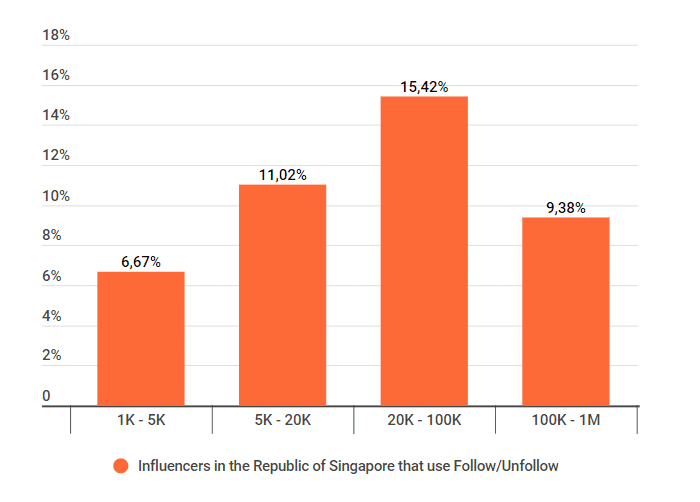
There were 1 972 000 Instagram users in Singapore on August 2019, which accounted for 34.9% of its entire population.
Instagram was launched in 2010 and rapidly gained its popularity.
With its 1 billion monthly active users (June 2018) Instagram becomes not only one of the leading social networks but also the most important platform for Influencer Marketing.
In this report, we will provide you with the most current Instagram influencers insights and benchmarks and give a data-driven look into the dark side of fraud schemes, that are used by Singapore’s influencers to fake popularity and get more money from brands.
Instagram influencer Landscape in Singapore
We break down influencers into five main influencer tiers by the number of Instagram followers.
Mega-influencers & Celebrities (over 1M followers)
They often have a very mixed audience with various topics of interest.
Their relationships with them are more distant compared to other groups of influencers.
They have the biggest reach but the lowest trust.
Macro-influencers (100K – 1M followers)
They are famous in a local community, you can think of them as “mini-celebrities.”
Their content is usually high-quality and is comprised of a certain passion or topic.
Micro (5K-20K followers) and Mid-tier influencers (20K-100K followers)
They have more niche audience that is highly engaged with the deeper connection.
Micro-influencers present in almost any sector: health and fitness, food, entrepreneurship, fashion, and beauty to name just a few prominent categories.
Nano-influencers (1K-5K followers)
They are regular consumers who are passionate and willing to share, but have little influence.
Distribution of influencers by Tiers

There are only few Mega-influencers in Singapore so we didn’t get them into account in this Report. The majority of Singapore influencers are Micro-influencers (58.2%).
Who are these influencers?

Core influencers in Singapore are women aged between 18 and 24 years old. There are also a big amount of male influencers aged between 25 and 34 years old.
Instagram Engagement Rate
For many marketers engagement is the most important metric and a popular KPI of brand awareness. But what exactly does it mean?
What is Engagement Rate?


Engagement Rate or ER is a commonly used benchmark of success on Instagram as it can determine if an influencer is connecting with their audience.
Highly engaged content with many likes and comments often stand a better chance of organically appearing on an Instagram feed.
Average Instagram Engagement Rate by Tiers in Singapore

Nano-influencers have stronger connections with their audience thus, their ER is higher. On the chart below you can see that nano-influencers have the highest ER (5.8%) and then ER is inverse to followers number.
It is also worth noting that the average engagement of Singapore’s influencers is about the same as the worldwide average, but Macro and Mega-influencers receive less engagement.
Average interactions per post by Tiers in Singapore

Compare the number of likes and comments between influencers with the similar followers number. Pay attention to Likes to Comments Ratio, this metric indicates how strongly influencer’s followers are involved in a dialogue.
Instagram influencer Fraud in Singapore
The influencer marketing industry is projected to be worth $5 to $10 billion by 2020 but research shows that the big number of influencers have falsely manipulated their follower numbers and engagement.
The market growth is directly linked with the cost-per-post value. How much a blogger would charge for a sponsored post hinges on one’s likes averaged per post and number of followers. This is the reason why fraud eventually became a thing: unscrupulous bloggers start buying likes and comments in bulk so that they can grab more money from the brands.
Influencer fraud is so common that marketing budgets are being impacted by it all over the world.
What is influencer fraud?
Organic Instagram growth is a long and arduous process. Not all influencers are ready to invest their time and money on it. Besides there are tons of apps and websites that tempt to get followers, likes and comments immediately in any amount and with quite a small sum.
The fraud starts when these impatient influencers connect with brands to advertise their products and services. Usually a brand agrees to pay a fee based on the number of followers the influencer has and ends up wasting their time and money.
How do influencers inflate their number of followers?

Among the most popular tricks are:
Buying followers
Using Follow/Unfollow
Buying likes and comments
Buying stories views
Using Comments Pods
How many Instagram influencers are involved in fraud in Singapore?

The highest percentage of fraud-free we will find in the group of influencers who have between 1K and 5K followers. 61.37% of influencers in this group are fraud free.
The vast majority of influencers have tried some flawed methods for Instagram growth at least once. Influencers who have over 5K followers understand that their numbers correlate with their earnings, thus they intentionally inflate their metrics.
The most controversial are mega influencers and celebrities. Approximately 10% of them artificially inflate their engagement and number of followers, but most of them are just victims of SPAM. We’ll provide details in the following sections.
What is Follow/Unfollow on Instagram?
The Follow/Unfollow trick or mass following is commonly used by influencers to find new followers. It has very simple mechanics:
An influencer’s account follows you, gives “likes” or posts a comment on Instagram.
You get a notification and follow them back.
They unfollow you after a couple of days.
Why is Follow/Unfollow Bad?
There is a fierce debate in the community of influencer marketing specialists about the usage of follow/unfollow trick. At HypeAuditor we believe this is SPAM. But more importantly, this method is directly prohibited by Instagram.
How can this damage advertisers?
According to the Instagram announcement, they will artificially reduce the reach of influencers who use third-party applications. Besides numerous articles in the media denouncing such influencers can also have a negative impact on the reputation of your brand.
How to Detect influencers who use Follow/Unfollow?
Just check out the Following graph on HypeAuditor, if you see these kinds of spikes it means that this influencer is using mass following to gain new followers.

How many Instagram influencers use Follow/Unfollow in Singapore?

The study shows that follow/unfollow is mostly popular among influencers who have between 20K and 100K followers, over 15% of them use this tactics.
Influencers who use this trick have the bigger percentage of non-reachable audience, who don’t see their posts, thus they have a lower reach.
Abnormal Growth
Most of the influencers increase their number of followers gradually. Every month more and more Instagram users are starting to follow them. Some promotion methods, advertising, mentions in media or a shoutout from another influencer could accelerate this growth, but nevertheless, the general pattern remains the same.
However, some influencers do not want to wait and use inauthentic methods to increase their followers number immediately. Unfortunately, most of these inflated followers are inauthentic.
How to detect Inauthentic Growth?

To detect growth anomalies you should check the Followers graph that shows the dynamics of followers growth. Analysis of this graph gives a lot of information about the account’s growth patterns and trends and also helps to detect if an influencer has bought followers.
Accounts that increase followers number artificially will show sudden rises and hockey-stick growth on a Followers graph.
Who are these inauthentic followers?
Inauthentic followers could be classified into 2 categories.
Mass followers
Instagram users with more than 1500 followings are identified as Mass Followers.
They use automatic tools for Follow/Unfollow. Mass followers don’t see the influencer’s posts.
Suspicious accounts
Bots, fake or stolen accounts and people who use specific services for bulk purchase of likes, comments and followers.
How many Instagram influencers buy followers in Singapore?

The easiest and fastest way to grow followers number is to buy them. Over 33% of influencers with 5K-20K followers, and 21.99% of influencers who have between 1K and 5K followers are buying followers regularly.
How many Instagram influencers artificially inflate their comments in Singapore?

Almost fifth part of influencers have inauthentic comments. The biggest percentage of them are on celebrities accounts. We believe this is not due to their inauthentic actions but due to the overall level of SPAM on Instagram. Most of the spam came from users who use Instagram Comment Tools and Bots. They target their comments based on: hashtags, geo location, followings of other accounts, specific accounts targeting.
There are two main inauthentic methods to boost the comments number:
Buying comments.
Comments Pods (we will look at them in more detail below).
What comments are inauthentic?
Comments to tag-to-win giveaways and contests, spam comments, and comments that come from Instagram Pods are considered inauthentic.
When we check Comments Authenticity, we take into account multiple factors, among them: commenter’s content and the quality of an account that left that comment.
We mark as suspicious comments that:
Consist of emojis only or words like: wow, cool, fantastic etc.
Are monosyllabically simple and irrelevant,
Consist of the mention of another account only.
How many Instagram influencers use Comment Pods in Singapore?

Investing time in Comment Pods make sense only for small accounts. That’s why this trick is commonly used only by influencers who have less than 20K followers.
10.79% of influencers who have between 1K and 5K followers use Comment Pods.
What is a Comment Pod?

Comment pods (Engagement Pods or Boost Groups) are groups of bloggers collaborating to run up their activity. They often gather on Facebook, Telegram or other chats. A blogger from such pod would make a post and throw a link to the chat with some comment: “likes, comments (3 words and more), saved.” And then he/she would go up the chat to see the last 10 tasks from other bloggers and carry them out. This method is definitely hard to see with eyes only as there are real people with real accounts and high-quality content, and they would write extended comments.
How to detect Comment Pods?
It’s hard and time-consuming to detect engagement pods manually. To do this, you should check every comment and a follower who left them. If you see that all posts are commented by the same group of users, it might be a pod. To detect pods at a HypeAuditor our machine-learning algorithm takes into account multiple factors, among them: behavioral patterns, commenter’s content and the quality of an account that left that comment.
Methodology
The report uses data from a wide variety of sources, including market research agencies, internet, and social media companies, news media, and our internal analysis.
We have collected and aggregated open data from a variety of sources: social platforms, catalogs, websites, crowdsourcing, and many more. After that, we processed the data by anonymizing, sorting and structuring, cleaning and removing any irregularities, and enriching the data.
Then we transformed the data into intelligent estimations by using best-in-class estimation and machine learning algorithms developed by our team of leading data scientists and influencer marketing experts.
About HypeAuditor
This report was made by HypeAuditor
HypeAuditor is an AI-powered Instagram and Youtube analytics tool that helps to get insights about the creator’s audience, increase advertisers’ ROI and safeguard authenticity in influencer marketing. It sets a standard for the Instagram analytics by providing the most accurate data.
HypeAuditor applies machine learning to determine behavioral patterns and identify fake followers and engagement on influencer accounts. It presents users with a breakdown of demographic data for an influencer’s audience and brings benchmarks for each metric for influencers with a similar number of followers.
For questions or details, contact
NIck Baklanov
marketing specialist at HypeAuditor
nick@hypeauditor.com
+1 347 708 0034















